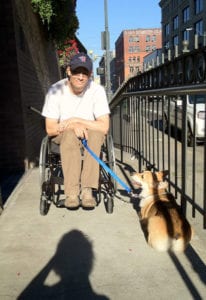
So I waited there. Just waited there. For a long time. Eventually one of the vested people approached and asked if I wanted to cross. I nodded. The man pointed out a temporary bridge down the street. We found the bridge, but there was a step up from the road. To make it accessible, workers had piled tarmac to form a steep, soft ramp. My wheels sank. I couldn’t get traction. The outing was a no go. “We’ll fix it,” my guide promised.
Restricted freedom of movement. Every person with a disability can tell a similar story. For decades and decades, we have had no legal means to address these restrictions.
Enter the Americans with Disabilities Act. Laws on the books that afford me the same rights as other citizens. It took a prodigious amount of civil action, constant organizing, and relentless diplomacy to get there. It was a long-fought campaign. That history is chronicled in Joseph Shapiro’s book, No Pity. In the category of life-changing reads, this one tops the charts. I’ve purchased and presented a dozen copies to family and friends. My own copy is well-thumbed, dog-earned, and underlined.
Before No Pity, I thought I was aware. Reading it, I realized my ignorance. The Disability Rights Movement was not included in my educational upbringing or graduate school journey. It is an ignored topic, a marginalized piece of our history. As my illness progressed, there was no obvious place to find out about my new identity and community. I wanted a wider perspective on the lived experience of people with disabilities.
I stumbled upon No Pity after a chance encounter with one of his pieces on National Public Radio. “This guy gets it,” I thought and hunted for more of his work. Joseph Shapiro deftly chronicles the history of mistreatment that led to the rise of the movement of my community. My new community. The book was about me. It was my new history.
The scene that both haunts and inspires me focuses on a rally organized by ADAPT, a disability rights organization, as part of their Wheels of Justice protest. In the spring of 1990, after several speeches from disability rights fighters, a group of wheelchair users crawled up the 83 marble steps of the Capitol building in Washington, D.C., dramatizing the inaccessibility of the government. The protesters dared to create a spectacular spectacle.
When I waited at the curb, I had the image of that climb in my mind. In my own small way, I was willing to be a spectacle. I was ready to make a scene. City of Seattle, I don’t need your pity. But I do need your help. Just to cross the street. Let me read you my rights.

Hi Randy,
Joe Shapiro could take a page out of your well constructed essay.
Another great entry, Randy. Nice work. Have you seen the film The Music Within? It was a random RedBox selection for me, and it turned out to be an incredible story…
Will read that book!
It’s an amazing, heart-breaking read. You can also listen to his podcasts and coverage of civil rights issues of the moment: http://www.npr.org/people/2101159/joseph-shapiro
Heartbreaking story, Randy. Emily (Randy’s niece, age 16) remarked that there has been no mention of the disability rights movement in her education, and nothing about people with disabilities or what their lives are like since 4th grade when for half an hour a few times during the year, one person comes to class to discuss and answer questions about their specific disability. That’s it. Oh, and one bad, 20-minute video about tolerance of kids with intellectual disabilities. Completely inadequate.
You’ve sent a copy of No Pity which sits by my bedside table — time to read it! And then give it to Emily!
“No Pity” is am easy read and you can jump from chapter to chapter depending on which ones interest you the most. Disability has been marginalized if not ignored for such a long time I takes a lot of effort and push to get it back into mainstream education. Let’t keep trying though! Thanks for your support.